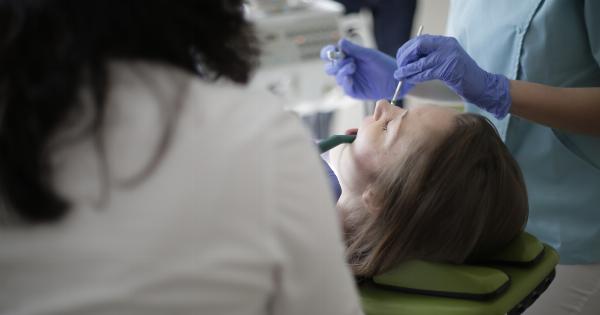Ear bleeding can be a cause for concern and may indicate a serious underlying condition. It is essential to seek immediate medical attention if you experience ear bleeding as it could be a sign of a potentially dangerous medical issue.
This article will discuss some of the causes of ear bleeding, signs and symptoms to watch out for, and why it is crucial to seek medical help promptly.
1. Common Causes of Ear Bleeding
Ear bleeding can occur due to various reasons, including:.
- Ear infections: Chronic or severe ear infections can lead to ear bleeding.
- Foreign objects: Inserting objects into the ear can cause injuries and subsequent bleeding.
- Trauma: An injury to the ear, such as a direct blow or head injury, can result in bleeding.
- Barotrauma: Changes in air pressure, like those experienced during air travel or scuba diving, can damage the eardrum and cause bleeding.
- Middle ear diseases: Conditions like otitis media or cholesteatoma can cause ear bleeding.
- Tumors: Benign or malignant growths in the ear can lead to bleeding.
2. Signs and Symptoms of Ear Bleeding
Identifying symptoms associated with ear bleeding is crucial for seeking immediate medical attention. Some common signs to look out for include:.
- Blood coming from the ear: This is the most obvious symptom of ear bleeding.
- Ear pain: Bleeding can cause discomfort and pain in the affected ear.
- Hearing loss: Some people may experience a sudden decrease in hearing abilities.
- Tinnitus: Ear bleeding may also be accompanied by a ringing or buzzing sound in the ear.
- Dizziness: In some cases, bleeding can cause dizziness or a spinning sensation.
- Fever: Ear infections leading to bleeding may also cause fever.
3. Why Immediate Medical Attention is Necessary
Getting prompt medical help for ear bleeding is essential because:.
- Identification of underlying cause: A healthcare professional can help determine the cause of the bleeding and treat it accordingly.
- Prevention of complications: Early intervention can prevent complications such as hearing loss, infections, or damage to the ear structures.
- Appropriate treatment: Seeking medical attention ensures that the right treatment is provided for the specific cause of ear bleeding.
- Expert examination: A doctor can perform a thorough examination of the ear to identify any injuries or abnormalities that may be causing the bleeding.
- Pain management: Medical professionals can provide relief from ear pain associated with bleeding.
4. When to Seek Emergency Care
While it is crucial to promptly seek medical attention for ear bleeding, certain situations require immediate emergency care. These include:.
- Severe bleeding: If blood is pouring out of the ear or if the bleeding is profuse and uncontrollable, emergency care should be sought immediately.
- Head injury: If the ear bleeding is a result of a head injury, it is vital to seek emergency medical attention to rule out any potential brain injury.
- Loss of consciousness: If the individual faints or loses consciousness, emergency care is necessary to assess the overall condition and provide appropriate treatment.
- Severe pain or discomfort: If the pain in the ear is unbearable or accompanied by severe dizziness, it is crucial to seek immediate medical attention.
5. How Ear Bleeding is Diagnosed and Treated
When seeking immediate medical attention for ear bleeding, a healthcare professional will typically perform the following:.
- Medical history: The doctor will ask questions about the symptoms, previous ear infections, recent trauma, or any other relevant medical history.
- Physical examination: A careful examination of the ear will be conducted to identify any visible injuries, discharge, or abnormalities.
- Ear microscopy: The healthcare professional may use an ear microscope to get a better view of the ear canal and eardrum.
- Further tests: Depending on the suspected cause of the bleeding, additional tests, such as imaging scans or blood tests, may be ordered.
Treatment for ear bleeding will depend on the underlying cause. Common treatment options include:.
- Antibiotics: If an infection is present, antibiotics may be prescribed to treat the underlying infection.
- Ear drops: In some cases, medicated ear drops may be used to alleviate symptoms and promote healing.
- Foreign object removal: If a foreign object is causing the bleeding, a medical professional will safely remove it from the ear.
- Surgical intervention: For more severe causes such as tumors or extensive injuries, surgical intervention may be necessary.
6. Tips for Preventing Ear Bleeding
While not all instances of ear bleeding can be prevented, you can reduce the risk by following these tips:.
- Maintain good ear hygiene: Keep your ears clean and dry, and avoid inserting any objects into your ears.
- Protect your ears: Use ear protection when exposed to loud noises or environments with rapid changes in air pressure.
- Treat ear infections promptly: Seeking medical treatment at the first sign of an ear infection can help prevent complications that may lead to bleeding.
- Be cautious during activities: Take appropriate precautions during activities that can potentially injure your ears, such as sports or using cotton swabs.
7. Conclusion
Ear bleeding should never be ignored, and immediate medical attention is crucial. Identifying the underlying cause of ear bleeding and receiving appropriate treatment is essential for preventing further complications and preserving hearing abilities.
If you or someone you know is experiencing ear bleeding, seek professional medical help promptly for a thorough examination and effective treatment.





























